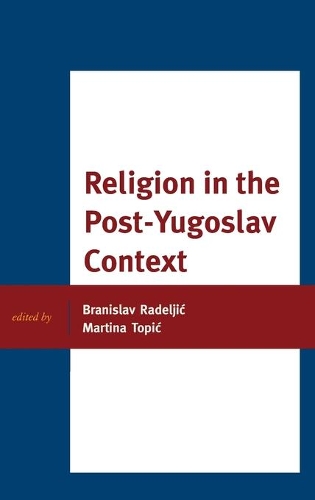
Religion in the Post-Yugoslav Context
(Hardback)
Publishing Details
Religion in the Post-Yugoslav Context
By (Author) Branislav Radeljic
Edited by Dr. Martina Topic
Contributions by Dino Abazovic
Contributions by Isa Blumi
Contributions by Ruica Cacanoska
Contributions by Raymond Detrez
Contributions by Sergej Flere
Contributions by Angela Ilic
Contributions by Danilo Jesenik
Contributions by Miran Lavric
Bloomsbury Publishing PLC
Lexington Books
1st July 2015
United States
Classifications
Professional and Scholarly
Non Fiction
History of religion
200.9497
Physical Properties
Hardback
282
Width 161mm, Height 236mm, Spine 24mm
549g
Description
Religion in the Post-Yugoslav Context brings together a diverse group of scholars, each of them specializing in the role of religion in one of the Yugoslav successor states. In addition to providing the readership with the understanding of both the general context (religion during the disintegration of the Yugoslav state) as well as more specific aspects (individual post-Yugoslav states), this rich collection complements the existing research in the fields of religious studies and political science. It represents an important source for scholars and students interested in the post-Yugoslav dynamic. Moreover, this kind of analysis is of major relevance for state and non-state actors involved in promotion of religious tolerance.
Reviews
Religion in the Post-Yugoslav Context, edited by Branislav Radelji and Martina Topi, presents a study of something called the post-Yugoslav context, which most of the local population is probably unaware of, since Yugoslavia has been forgotten by now. While the wars of the 1990s have ended, the postwar is still there and relevant. . . .Among the area studies specialists, the Radelji-Topi volume will be most serviceable to students of the recent history of former Yugoslavia. * Slavic Review *
This volume is required reading for scholars engaging with religion in the post-Yugoslav space, as well as anyone trying to understand the political culture of the region. Its fresh perspectives on the contested notions of religion, desecularization, and the nation-state demonstrate the complexity and ambivalence of religions role in the post-conflict context of the former Yugoslavia. -- Srdjan Sremac, VU University Amsterdam
This fine collection is an imperatively needed contribution to Yugoslav studies. Religion in the Post-Yugoslav Contextdoes fill a badly felt gap in the field of the Yugoslav wars. By carefully assessing the role of religion, the authors demonstrate that religious issues formed the context rather than the reason for the breakup of Yugoslavia and the outbreak of the wars. But they do not downplay religion's role, and thedistinct, well written and informative essaysremind us of the fragility and diversity of the (post-) Yugoslav mosaic. -- Alexander Korb, University of Leicester
Author Bio
Branislav Radelji is associate professor of international politics at the University of East London. Martina Topi holds a PhD in sociology from the University of Zagreb and works at Leeds Beckett University.
